This article needs to be updated.(April 2022) |
Mohammad Hashim is an Iraqi independent politician who served as Trade Minister in the Government of Adil Abdul-Mahdi. [1]
He was approved by the Council of Representatives on 24 October 2018. [1]
This article needs to be updated.(April 2022) |
Mohammad Hashim is an Iraqi independent politician who served as Trade Minister in the Government of Adil Abdul-Mahdi. [1]
He was approved by the Council of Representatives on 24 October 2018. [1]

Baghdad is the capital of Iraq and the second-largest city in the Arab world after Cairo. It is located on the Tigris river. In 762 AD, Baghdad was chosen as the capital of the Abbasid Caliphate, and became its most notable major development project. Within a short time, the city evolved into a significant cultural, commercial, and intellectual center of the Muslim world. This, in addition to housing several key academic institutions, including the House of Wisdom, as well as a multiethnic and multi-religious environment, garnered it a worldwide reputation as the "Center of Learning".

Estimates of the casualties from the Iraq War have come in several forms, and those estimates of different types of Iraq War casualties vary greatly.

Izzat Ibrahim al-Douri was an Iraqi politician and army field marshal. He served as Vice Chairman of the Iraqi Revolutionary Command Council until the 2003 U.S. invasion of Iraq and was regarded as the closest advisor and deputy under President Saddam Hussein. He led the Iraqi insurgent group Naqshbandi Army.

Muqtada al-Sadr is an Iraqi Shia Muslim cleric, politician and militia leader. He is the leader of the Sadrist Movement and the leader of the Peace Companies, a successor to the militia he had previously led during the American military presence in Iraq, the "Mahdi Army." In 2018, he joined his Sadrist political party to the Saairun alliance, which won the highest number of seats in the 2018 and 2021 Iraqi parliamentary elections.
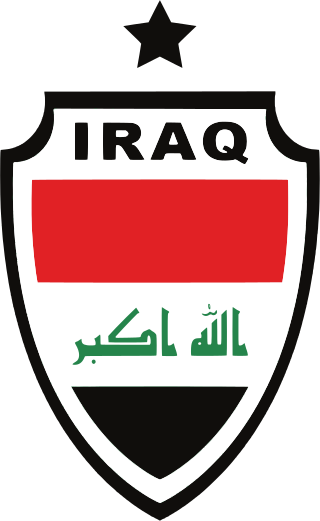
The Iraq national football team represents Iraq in international football and is controlled by the Iraq Football Association (IFA), the governing body for football in Iraq. Iraq's usual home venue is the Basra International Stadium.

Kurdistan Region is an autonomous administrative entity within the Republic of Iraq. It comprises four Kurdish-majority divisions of Arab-majority Iraq: the Erbil Governorate, the Sulaymaniyah Governorate, the Duhok Governorate, and Halabja Governorate. The KRI is bordered by Iran to the east, by Turkey to the north, and by Syria to the west. It does not govern all of Iraqi Kurdistan, and lays claim to the disputed territories of northern Iraq; these territories have a predominantly non-Arab population and were subject to the Ba'athist Arabization campaigns throughout the late 20th century. Though the KRI's autonomy was realized in 1992, one year after Iraq's defeat in the Gulf War, these northern territories remain contested between the Kurdistan Regional Government and the Government of Iraq to the present day. In light of the dispute, the KRI's constitution declares the city of Kirkuk as the capital of Iraqi Kurdistan. However, the KRI does not control Kirkuk, and the Kurdistan Region Parliament is based in Erbil. In 2014, when the Syria-based Islamic State began their Northern Iraq offensive and invaded the country, the Iraqi Armed Forces retreated from most of the disputed territories. The KRI's Peshmerga then entered and took control of them for the duration of the War in Iraq (2013–2017). In October 2017, following the defeat of the Islamic State, the Iraqi Armed Forces attacked the Peshmerga and reasserted control over the disputed territories.
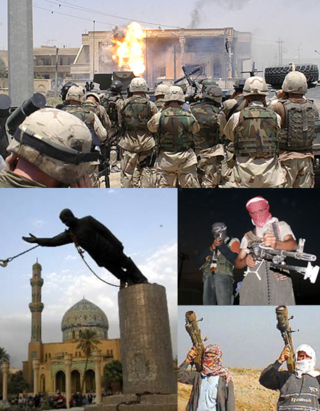
The Iraq War was a protracted armed conflict in Iraq from 2003 to 2011. It began with the invasion of Iraq by the United States-led coalition that overthrew the Ba'athist government of Saddam Hussein. The conflict continued for much of the next decade as an insurgency emerged to oppose the coalition forces and the post-invasion Iraqi government. US troops were officially withdrawn in 2011. The United States became re-involved in 2014 at the head of a new coalition, and the insurgency and many dimensions of the armed conflict are ongoing. The invasion occurred as part of the George W. Bush administration's war on terror following the September 11 attacks.

Iraq, officially the Republic of Iraq, is a country in the Middle East. It is a federal parliamentary republic that consists of 19 governorates. The country is bordered by Turkey to the north, Iran to the east, the Persian Gulf and Kuwait to the southeast, Saudi Arabia to the south, Jordan to the southwest and Syria to the west. The capital and largest city is Baghdad. The Iraqi people are diverse, with similarly diverse geography and wildlife. Most Iraqis are Muslims – minority faiths include Christianity, Yazidism, Mandaeism, Yarsanism and Zoroastrianism. The official languages of Iraq are Arabic and Kurdish; others also recognised in specific regions are Turkish (Turkmen), Suret (Assyrian), and Armenian. Iraq is the 33rd most-populous country in the world.

The Islamic State (IS)—also known as the Islamic State of Iraq and the Levant, Islamic State of Iraq and Syria (ISIS), and by its Arabic acronym Da'ish—is a Salafi jihadist transnational Islamist terror group and former unrecognised quasi-state. It was founded by Abu Musab al-Zarqawi in 1999 and gained global prominence in 2014, when its militants conquered large territories in northwestern Iraq and eastern Syria, aided by the Syrian civil war. By the end of 2015, it ruled an area with an estimated population of twelve million people, where it enforced its interpretation of Islamic law, administered an annual budget of more than US$1 billion, and had more than 30,000 fighters under its command. After years of intense and grinding combat with American, Iraqi, and Kurdish forces, by 2019 it had lost all its Middle Eastern territories and returned to insurgency tactics in the regions it once controlled, operating from remote hideouts and continuing its propaganda efforts, which have gained it a strong following in northern and Sahelian Africa.
The 25 October 2009 Baghdad bombings were attacks in Baghdad, Iraq which killed 155 people and injured at least 721 people.
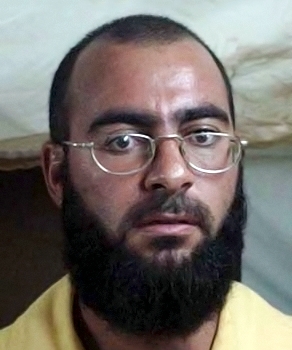
Ibrahim Awad Ibrahim al-Badri, commonly known as Abu Bakr al-Baghdadi, was an Iraqi militant who was the first caliph of the Islamic State from 2014 until his death.
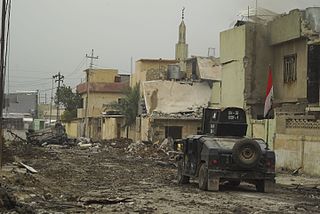
The War in Iraq was an armed conflict between Iraq and its allies and the Islamic State from 2013 to 2017. Following December 2013, the insurgency escalated into full-scale guerrilla warfare following clashes in the cities of Ramadi and Fallujah in parts of western Iraq, and culminated in the Islamic State offensive into Iraq in June 2014, which lead to the capture of the cities of Mosul, Tikrit and other cities in western and northern Iraq by the Islamic State. Between 4–9 June 2014, the city of Mosul was attacked and later fell; following this, Prime Minister Nuri al-Maliki called for a national state of emergency on 10 June. However, despite the security crisis, Iraq's parliament did not allow Maliki to declare a state of emergency; many legislators boycotted the session because they opposed expanding the prime minister's powers. Ali Ghaidan, a former military commander in Mosul, accused al-Maliki of being the one who issued the order to withdraw from the city of Mosul. At its height, ISIL held 56,000 square kilometers of Iraqi territory, containing 4.5 million citizens.

Opération Chammal is a French military operation in Iraq and Syria launched to help curtail the expansion of the Islamic State of Iraq and the Levant and to support the Iraqi Army. Its name comes from the Shamal, a northwesterly wind that blows over Iraq and the Persian Gulf states.

Operation Okra is the Australian Defence Force (ADF) contribution to the military intervention against the Islamic State. The force is part of Joint Task Force 633 in the Middle East. The operation commenced on 31 August 2014, and its initial stated aim was to combat ISIL threats in Iraq. In September 2015, the Australian airstrikes were extended to Syria. In June 2017, flights in Syria were temporarily halted in response to American forces shooting down a Syrian Air Force jet, before later being resumed.

Combined Joint Task Force – Operation Inherent Resolve (CJTF–OIR) is a multinational military formation established by the U.S.-led international coalition against the Islamic State with the stated aim to "degrade and destroy" the organization. Led by United States Army Central (ARCENT), it is composed of military forces and personnel from over 30 countries.
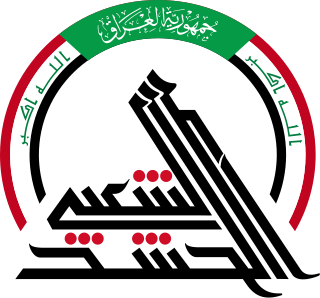
The Popular Mobilization Forces, also known as the People's Mobilization Committee (PMC) and the Popular Mobilization Units (PMU), is an Iraqi state-sponsored umbrella organization composed of approximately 67 different armed factions, with around 230,000 fighters that are mostly Shia Muslim groups, but also include Sunni Muslim, Christian, and Yazidi groups. The Popular Mobilization Units as a group was formed in 2014 and have fought in nearly every major battle against ISIL. It has been called the new Iraqi Republican Guard after it was fully reorganized in early 2018 by its then–Commander in Chief Haider al-Abadi, Prime Minister of Iraq from 2014 to 2018, who issued "regulations to adapt the situation of the Popular Mobilization fighters".

The Battle of Mosul was a major military campaign launched by the Iraqi Government forces with allied militias, the Kurdistan Regional Government, and international forces to retake the city of Mosul from the Islamic State (ISIL), which had seized the city in June 2014. The battle at the time was the world's single largest military operation since the 2003 invasion of Iraq and was considered the toughest urban battle since World War II.
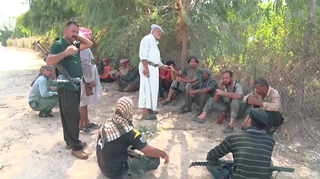
The Islamic State insurgency in Iraq is an ongoing low-intensity insurgency that began in 2017 after the Islamic State (ISIS) lost its territorial control in the War in Iraq, during which ISIS and allied White Flags fought the Iraqi military and allied paramilitary forces.